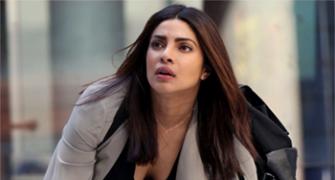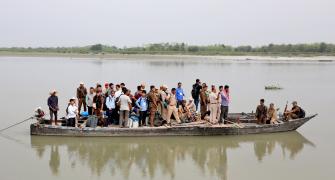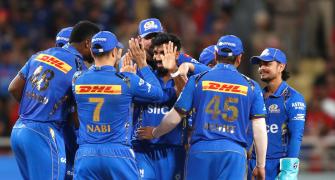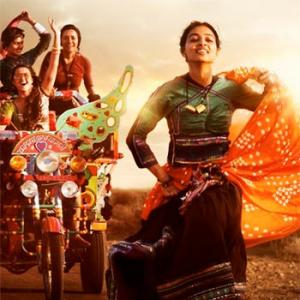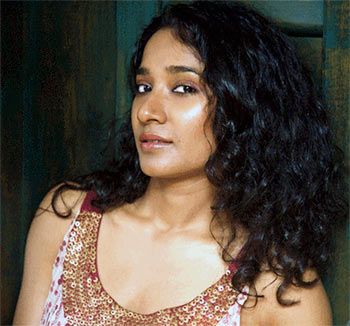 'In a country where we still sell fair n lovely/handsome and show adverts,
'In a country where we still sell fair n lovely/handsome and show adverts,
Where people don’t get jobs because of their complexion,
Where every matrimonial advert demands a fair bride or groom and the color bias is so strong,
In a society which has a deep-seated problem with dark skin and which also has deep roots in our caste system.
In a country, where dark skin is marginalized, making fun of it is not roast.'
Actress Tannishtha Chatterjee has slammed a television comedy show, to which she was invited, for making fun of her skin colour in the name of Roast.
To promote her recently released film Parched, Tannishtha -- along with her director Leena Yadav and co-star Radhika Apte -- went on the show Comedy Nights Bachao Taaza.
In a lengthy Facebook post, the actress wrote about her frustration with the way her dark skin tone was made fun of.
'Something shocked me out of my wits yesterday. I was invited as a guest to a popular comedy show called comedy night bachao to promote my latest release Parched with my director Leena Yadav and my co-actor Radhika Apte.'
Tannishtha said when she was told she would be the subject of a Roast, the actress thought it would be on the lines of US TV shows like Saturday Night Live and was looking forward to it.
'Then this show began. And this was an entirely novel understanding of Roast that equates itself with bullying. To my utmost horror, I soon realised that the only quality they found worth roasting about in me was my skin tone. It began with 'aap ko jamun bahut pasand hoga zaroor! Kitna jamun khaya aapne bachpan se?' And went on in that direction,' she wrote.
The 35-year-old actress initially tried to go along with the show but could not tolerate the offensive jokes after a point.
'I could not believe I was sitting in a nationally televised comedy show in 2016 in Mumbai amid such regressive (I can't call it humour), and blatantly racist content. Though I was feeling suffocated, I decided to give it another chance, and sat through another equally offensive segment.
'Nothing changed. I could not sit there anymore. I had to leave. When I told the organisers what I felt, they said, 'But we told you it is a roast!' I explained to them the common perception of roast and how it is different from bully. That there is no humor value in a joke about some ones physical attributes especially one that stems from deep prejudices.'
Tannishtha said many of her friends told her not to take the jokes seriously but she argued that something, which comes from deep-rooted biases and a hangover of white skin should not be made fun of.
Tannishtha said while she had nothing personal against the show, she felt that making fun of skin tone is not roast.
'In a country where we still sell fair n lovely/handsome and show adverts, where people don’t get jobs because of their complexion, where every matrimonial advert demands a fair bride or groom and the color bias is so strong, in a society which has a deep-seated problem with dark skin, which also has deep roots in our caste system. In a country where dark skin is marginalized, making fun of it is not roast.'
'Even considering that dark skin is a joke comes from that very deep prejudice. I tried to explain why this is not personal and it is a larger issue about what our mindset is and why cracking jokes about deep biases in our society is irresponsible.'
Tannishtha isn't looking for an apology from the channel.
'It is not a question about apologizing to me, but propagating this idea and continuing with this mindset in the name of comedy is what is hugely problematic, specially because it is a popular show on a nationalized Chanel. It has nothing to do with the show at a personal level. But it leads to a larger debate.
'Why does skin tone still lend itself to jokes? How is it funny to call someone dark? I don’t get it. In an India of 2016, I still have to be apologetic about my skin tone? What is this white-skin hangover? Where does all our pride as a nation go away when it comes to the acceptance that most of us have a darker skin tone?'
Once I was asked 'Your surname is Chatterjee? Oh you are Brahmin.. What is your mothers surname? Maitra! Oh…. She is Brahmin too...'
'And then indirectly he hinted how is my skin tone still dark? This is so deep rooted and linked to our perceptions of caste, class and skin tone. Upper caste =Fair skin =touchable. Lower caste=dark skin=untouchable. Yes I have pronounced it.
'Probably most of us will not admit to our hatred for the dark skin also comes from our caste bias. I made a film called Parched. Why I am saying 'I made' is because all of us who are a part of this film feel that this was not just a film for us. That its MY FILM. We wanted to express a lot of things about gender, body, skin, sexuality , caste etc through our stories. It has been a revelation that the journey just begins here as we realise through our promotional process that we are constantly subjected to exactly those issues from which this film was engendered.
'The list is long long and the biases are deep deep….The privilege that allows these are what we had hoped to challenge.'

